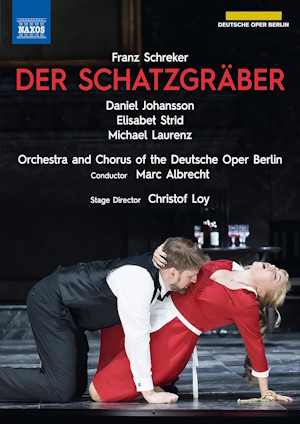
Franz Schreker (1878-1934)
Der Schatzgräber (1918) Opera in a prologue, four acts and an epilogue, with a libretto by the composer
Els (A Waitress at Court): Elisabet Strid, soprano
Elis (A Travelling Ballad Singer): Daniel Johansson, tenor
Der Narr (The Court Fool or Jester): Michael Laurenz, tenor
Chorus of the Deutsche Oper Berlin/Jeremy Bines
Orchestra of the Deutsche Oper Berlin/Marc Albrecht, Christof Loy (stage director)
Filmed in May 2022 at the Deutsche Oper Berlin, Germany
Naxos 2.110761 DVD [165]
This opera is mid-period Frans Schreker (1915-1918). Four operas precede it, another four follow. But it was his last big success, as his musical style became less fashionable. His music combined Wagnerian leitmotifs with huge orchestration that went beyond Wagner into the chromatic, expressionist territory of early Schonberg, yet avoided significant atonality. Schreker suffered from increasing antisemitism and from victimisation by the Nazis. Performances of his works were cancelled. He was dismissed as Director of the Musikhochschule in Berlin and in 1933 from his post as professor of composition at the Akademie der Künste. He suffered a stroke in December 1933 and died next March. His music was banned in Germany. It is only relatively recently that it has been played again, and there is a significant list of discs devoted to his œuvre.
The DVD booklet includes a very detailed synopsis by stage director Christof Loy. I found it a necessary aid in my understanding of the action, even in the presence of subtitles. (If you want the basic shape of the story, Wikipedia comes to the rescue.) The booklet also contains conductor Marc Albrecht’s interview with Loy, in which they discuss the score of the opera in detail.
Musically, the opera has a dense colourful orchestration. Multiple leitmotifs and writhing harmonies emphasize how greed for gold and drive for sexual fulfilment can cast people into damnation when employed as a weapon of control. This an intense Tristan-like level, almost hysterically so at times. In the third act, Schreker quotes from Tristan und Isolde, and there is his Tristan chord in many variations. In addition, Schreker moves far beyond Wagner into the world of Debussyian impressionism, with deep gongs and bells and flutes in whole-time scales.
I found it difficult to latch on to the various leitmotif-derived themes, especially when I was distracted by the action. I discovered that the orchestral love scene in Act III (or an orgy, as portrayed here) helped me to organise the music motifs in my mind – when I listened without watching. Schreker actually published it as Symphonic Interlude, an independent orchestral work; it has been recorded at least once (on Chandos CHAN9797).
The singers are pretty much uniformly excellent. Michael Lorenz’s very individual voice stands out in the role of The Fool. Daniel Johansson does energetically powerful work as Elis alongside Elisabet Strid as the very unlikeable, self-centred Els. She successfully navigates the demanding part without resorting to ugly tone.
Unusually enough, the important part of the Queen is not sung but acted. Doke Pauwells is a dramaturg, actor and dancer. In this role, she portrays a listless, sad, wasting-away young woman, who is transformed on the recovery of her stolen jewellery. Given how loud and overwhelming Schreker’s music is, she does it very well. In fact, all the singers are good actors.
The visual production is excellent, with a typically faceless modern setting. The male cast are dressed in 1920s dinner jackets and trousers or militaristic garb. The few females appear in dresses appropriate for a dinner party, except the queen who appears in a bridal dress. Els, the serving maid, is dressed in black and white but changes into standard dresses as the opera continues. The king is made to stand out by adopting a golden crown, and the fool/jester wears a pink three-cornered hat.
The images on the DVD are clear and vivid, and stage lighting allows easy visibility. Sonically, the production is very good indeed.
Jim Westhead
Help us financially by purchasing from



Other cast members
Albi: Patrick Cook, tenor
Der Vogt (The Bailiff): Thomas Johannes Mayer, baritone
Der Kanzler (The Chancellor): Clemens Bieber, tenor
Der König (The King): Tuomas Pursio, bass-baritone
Die Königin (The Queen): Doke Pauwels, actor (not singing)
Der Graf (The Count) / Herold (A Herald) / Der Magister (The Schoolmaster): Michael Adams, baritone
Der Schultheiß (The Mayor): Joel Allison, bass-baritone
Der Junker (The Young Nobleman): Seth Carico, bass-baritone
Der Schreiber (The Scribe): Gideon Poppe, tenor
Der Wirt (The Innkeeper): Stephen Bronk, bass-baritone
Dancers: Niall Fallon, Nicolas Franciscus, Hanno Jusek, Stefan Liebermann, David Martinez Morente, Sonja Isabel Reuter, Jeanna Serikbayeva, Michael Gernot Sumper, Koray Tuna, Benjamin Werth, Xenia Wolfgramm, Tobias Wollschläger
Production staff
Set Designer: Johannes Leiacker
Costume Designer: Barbara Drosihn
Lighting Designer: Olaf Winter
Dramaturge: Dorothea Hartmann
Film Director: Götz Filenius
Technical details
Subtitles in German, English, French, Japanese, Korean
NSC 16:9, Dolby Digital 2.0 and Surround 5.1, Region 0 (Worldwide), DVD 9.


















